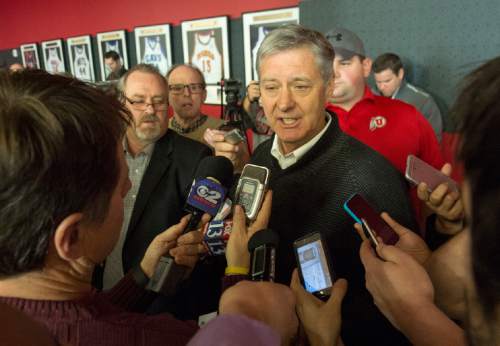This is an archived article that was published on sltrib.com in 2016, and information in the article may be outdated. It is provided only for personal research purposes and may not be reprinted.
A dubious kind of history will be made this weekend in San Jose.
When the Utes take the field at CEFCU Stadium on Saturday nigth to play the Spartans, they'll be the first Power 5 opponent to play at San Jose State in a decade.
The Spartans have played strong programs in the past 10 years: Alabama, Wisconsin, USC and Nebraska have all taken them on. But SJSU always has had to travel to get those teams on the docket, although they've been paid to do so.
The last Power 5 team to play at CEFCU Stadium was Stanford in 2006 — when the Cardinal were in the middle of building their own new stadium.
"It's exciting for us to be able to host a Pac-12 program," SJSU coach Ron Caragher said during his Monday press conference. "It's nice for our players to be able to the confines of their home stadium. … We're going to get a chance to see where we're at and how we match up against a Pac-12 school."
While it will be an exciting day for San Jose State players and fans, this arrangement may have Utah fans wondering why they're playing a Group of Five team on the road — only a year after wrapping a home-and-home with Michigan, no less.
Utah isn't the only team that does it. Washington State played at Boise State (a loss) and Cal played at San Diego State (a loss) last weekend. Arizona State is headed to UT-San Antonio this weekend.
An examination of the schools who do home-and-homes with Group of Five schools and those who pay them to play at home (USC, Stanford, UCLA) is at least in part a reflection of the budget disparity between Power 5 programs. The ones at the top of the money rankings don't travel for such games. Programs like Utah, ranked 11th in the Pac-12 in the most recently available USA Today budgets, do.
"It's harder to get a Group of Five school to come to your place and not return," Utah athletic director Chris Hill said. "The price goes up."
Utah's approach to football scheduling is known as the "ABC" philosophy. The team aims for an "A" game against a high-level major opponent, a "B" game against a Group of Five opponent, and a "C" game against either a low-level FBS or an FCS team. In this system, Hill says he counts BYU as an "A" game due to the emotional and physical intensity of the rivalry.
While some schools take similar approaches, Utah typically does home-and-home deals with "B" opponents rather than pay them to come to Rice-Eccles Stadium for a one-off game. Utah finished a home-and-home last year with Fresno State, and has future home-and-home deals with Northern Illinois and San Diego State. Utah's next home-and-home deal with a Power 5 opponent is Baylor in 2023 and 2024.
While Hill said arranging home-and-homes helps even out Utah's schedule between six and seven home games, a large factor is money. The Utes paid $435,000 to FCS Southern Utah to take a 24-0 loss in this year's season opener. Group of 5 teams run much higher: The Huntsville Times recently reported that Conference USA team Southern Miss will receive $3.55 million for playing two games at Auburn in the next two seasons, roughly $1.77 million per game.
When the Utes schedule, they attempt to go to areas in their recruiting footprint. Northern California has become an increasing area of importance ever since the Utes plucked Devontae Booker out of Sacramento. But given that their out-of-state footprint is where everyone else is trying to recruit — Southern California, Texas and Florida — it's not always easy to schedule games in those areas when other teams are, too.
Hill said the Utes sometimes rely on a program that helps schools play matchmaker: They can see which teams have open weekends in future years, and try to reach out to those teams to make a date for a game. But it's far from an exact science, and the Utes are also trying to balance the competitiveness of each schedule, and not get too many or too few home games.
"The first part of scheduling is balance, making sure you're balanced in your non-conference games," said coach Kyle Whittingham, who works on the schedule with deputy athletic director Kyle Brennan. "There are only three games now that we deal with, non-conference-wise. Balance is in the equation, making sure you don't under-schedule or over-schedule."
The one element that could affect Utah's future scheduling is if conferences decide to ban games against FCS opponents. The discussion hasn't gotten much traction so far, Hill said, but as TV pays billions for the right to broadcast games, they may become frustrated with Power 5 teams bringing in small-time schools with little to no national recognition.
Whether or not that change happens, lower-profile FBS teams like San Jose State will continue to get the chance to entertain the Utes. Stanford's visit in 2006 ended in a 35-34 win for the Spartans, the last time they knocked off a Pac-12 opponent. Caragher is hoping for more of the same.
"[Our players] will come in and want to bring their A-game," he said. "I'm looking forward to a fun game Saturday evening."
Twitter: @kylegoon —
Utah at San Jose St.
P Saturday at San Jose, Calif., 8:30 p.m.
TV • CBS Sports Network
Utah's non-conference road future
2017 • at BYU
2018 • at Northern Illinois
2019 • at BYU
2020 • TBD
2021 • at San Diego State
2022 • TBD
2023 • at Baylor
2024 • TBD



